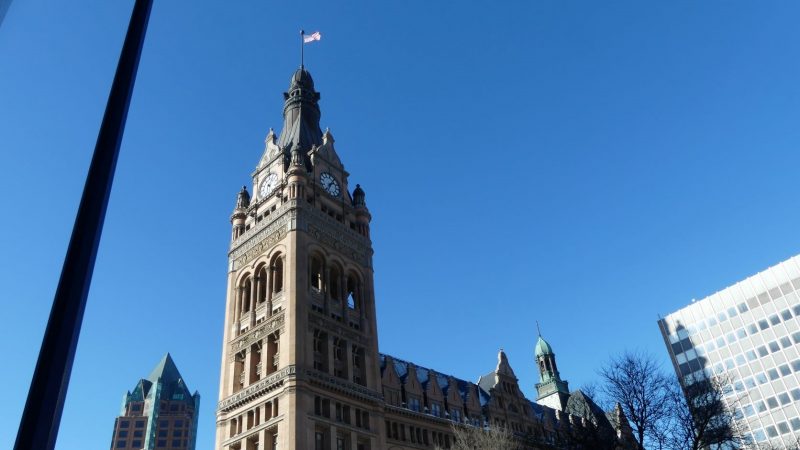Milwaukee Common Council members vowed to take legal action on state-imposed restrictions on the use of city funds before a vote approving a new 2 percent sales tax to address ongoing pension obligations.
The 12-3 vote yesterday exceeded the two-thirds majority needed to approve the tax, which will kick in Jan. 1. The two-thirds margin was one of the requirements in the shared revenue bill Dem Gov. Tony Evers signed into law that increases state aid to most cities by a minimum of 20 percent, though Milwaukee will get a 10 percent bump.
>> WisPolitics is now on the State Affairs network. Get custom keyword notifications, bill tracking and all WisPolitics content. Get the app or access via desktop.
Common Council members said they would fight back against policy provisions in the law that only apply to Milwaukee.
Ald. Bob Bauman opened discussions by arguing Milwaukee has struggled financially for years and the city’s budget employees have staved off the fiscal cliff, but this time is different.
“The wolf is at the door, and we can’t chase the wolf away anymore,” Bauman said.
He also vowed the city would take legal action to strike down what many have called poison pill policy provisions. Bauman said the city would continue to pursue expanding its streetcar system, funding diversity, equity and inclusion efforts, and instruct its lobbyists to reverse Milwaukee-specific provisions in the state’s new shared revenue deal.
“A lot of these mandates, a lot of these policy provisions, are very well set up for challenges under Home Rule,” he argued.
According to the League of Wisconsin Municipalities, Home Rule “is the ability of cities and villages to govern themselves in local matters without state involvement or interference.”
Those voting no on approving the sales tax were: Andrea Pratt, Mark Chambers Jr. and Milele Coggs.
Pratt urged the Council to think about the impact on those struggling to make ends meet. The daughter of former Milwaukee Common Council President and acting Mayor Marvin Pratt said she vehemently rejects the idea Milwaukee doesn’t have a choice between saving itself and helping its citizens who are struggling financially.
“I choose to not build a city on the back of elders who are on a fixed income,” she said. “I choose not to have struggling working families foot the bill while they are simultaneously targeted by poison policy.”
Ald. Russell Stamper said the “bad deal” predates some of the key players who negotiated it, arguing many at the Capitol behind the deal have had an ax to grind with Milwaukee since at least former Mayor Tom Barrett entered office in 2004. Stamper said they’re no friends of the city.
“And if they are not our friends, then they are our enemies,” he said. “Make no mistake about that, they are our enemies. They’re happy or proud that they gave us their bill to implement a sales tax. But one of my mentors always said if you stick a knife in the back nine inches, and pull it out six inches, there’s still no progress.”
Coggs said some business owners in her district fear the 2 percent hike will drive customers out of the city to buy products and avoid the increased prices. She also said minority-owned businesses fear their chances of getting government contracts will drop with the law, which bars the city from spending money on diversity, equity and inclusion efforts.
Quoting one of her constituents, Coggs told the Council, “Fight.”
“Stop accepting peanuts from the state; don’t let the state put us in a chokehold,” she said.
Chambers said he put the question to his constituents in a survey because he thinks the question should’ve gone to referendum, something lawmakers had in the original version of the shared revenue bill. He said the results were “overwhelmingly ‘no.'”
Meanwhile, the Milwaukee County Board took public testimony yesterday on the additional 0.4 percent sales tax it could impose under the shared revenue law.
The board could vote later this month on the proposal, which would require the support of two-thirds of the body. If it’s approved, city of Milwaukee residents would see their combined state and local sales tax climb to 7.9 percent.
By comparison, the combined sales tax in Chicago is 10.25 percent, while it’s 8.03 percent in Minneapolis and 6 percent in Detroit.



